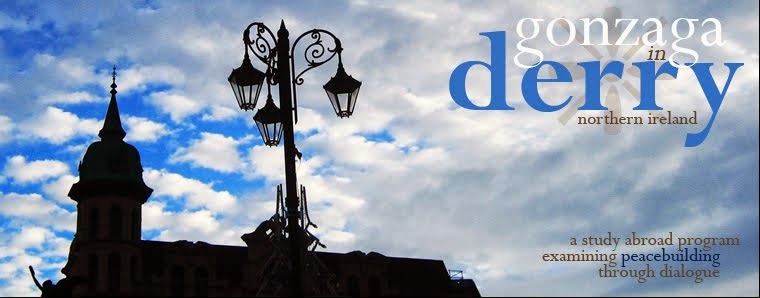by Amy Belisle
| Seamus Farrell speaking |
The breadth of experiences Farrell holds helps to focus the
lens around how he assists to manage, mediate and resolve conflict in a manner
where people are left feeling complete and respected. He was born and grew up in Northern Ireland;
however, his original vocation as a Roman Catholic priest sent him on a journey
which challenged and shaped his perspective around the work he does with The
Junction. Farrell spent 25 years in Africa
working initially in community development work; during his time in Africa, his
focus shifted to conflict resolution.
The context of his work in conflict resolution within Africa was around ethnic
diversity, the struggle for resources and the interface between Christianity
and Islam in Northern Nigeria. His work
in Africa culminated with an engagement in South Africa, before Nelson Mandela
was released from prison. The work
Farrell did in South Africa was addressing conflict within the black community
and organizing the leadership within those communities. Farrell’s involvement was at the request of
“church people [leaders]” to assist with the issues of dysfunctional leadership
at local levels within the struggle against Apartheid.
Farrell’s role with the community was to help the members to
have a better understanding of their social realities, and in the course of
building up this understanding of their realities he worked with the people to
come to a mutual understanding to begin in the development of democratic
leadership. Farrell’s work was not
without personal consequences, in that he was imprisoned in South Africa for
political reasons. Upon his release and
forced return to Northern Ireland in 1981, he transferred his efforts to the struggles
in Northern Ireland. The experience in South Africa brought Farrell to a
self-awareness and an awareness of the need to operate strategically, not just
to be busy doing good things. In
operating strategically, one could bring about societal impact – bring about
change in reality.
"The primary victim of conflict is truth." -Seamus
Farrell
Through the times of The Troubles, Farrell had a voice which
was heard at various levels and across both sides of the conflict, enabling him
to be an active participant in the peace process within Northern Ireland. The nature of his role does not allow for
complete disclosure, but his efforts were contributory to bringing about key
political arrangements. The work Farrell does with The Junction, in the context
of Ethical and Shared Remembering, focuses on dealing with the sectarian
narrative of the past in order to bring about a change in Northern Ireland’s
reality. Farrell’s role as a facilitator
allows him to work with the people of Northern Ireland who have come to
question the assumptions of their own experiences. The facilitated exploration (i.e.
shared and ethical remembering) of these assumptions uses education to assist
individuals with the many gaps in their understanding through honoring the
diversity of perspectives.
| Farrell interacting with faculty and students from Pacific Lutheran University |
Ethical and Shared Remembering calls upon those seeking to
understand their experiences to take a personal journey where they find
themselves being confronted with questions around their assumptions. With
Ethical and Shared Remembering, the effort is not about offering a definitive
account of events, but rather an account that captures the multiplicity of
narratives and perspectives.
“We run the risk of repeating ourselves unless we can begin to come to an understanding of our multiple narratives and create a future that is different from the one that was completely overwhelmed by a sectarian version of what happened.”- Seamus Farrell
In reflecting on his experiences as a facilitator, Farrell
characterizes these experiences as incredibly diverse in the context of the
circumstances. Facilitation for Farrell
involves a profound respect for what individuals believe about what happened
and an appreciation for the openness to see and hear another perspective. The most fruitful encounters Farrell has
experienced in his work have been with diverse groups (i.e. different
identities), because the encounters have involved various levels of
sharing. Conversely, those encounters
which have been most challenging are those where the individuals are locked
into militarized politics as the way to do things. The justification for these individuals comes
from an absolute belief in their version of what happened and the rightness of
the militarized politics of the time.
Farrell as a facilitator does not seek to challenge identities; rather
he approaches them with a level of sensitivity, and a focus on looking to the
future. With this future oriented
perspective, he honors the individual’s right to believe what they believe;
with the hope they are willing to reciprocate by allowing the “other” to
express their beliefs.

No comments:
Post a Comment